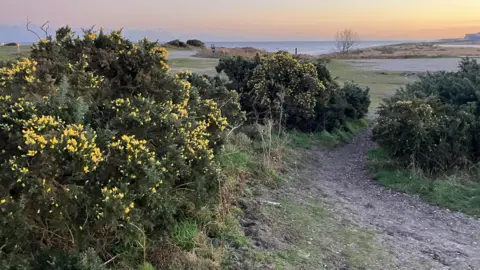Trial to restore Dunwich Heath heather continues amid freezing weather
 Guy Campbell/BBC
Guy Campbell/BBCFreezing temperatures have not deterred a trial to restore heathland affected by a drought in 2022.
The National Trust said an infrared drone survey at Dunwich Heath completed last summer revealed a 60% loss in heather at the site.
Trials of different combinations of techniques to establish the quickest method to restore heather have been taking place over the winter.
Area Ranger Sam Cooper said it could take years to see results.
During the drought, Mr Cooper estimated that 80% of the total heather at the site died off, which he said "obviously wasn't good for the habitat or the birds".
Work has included taking cuttings or scrapings from the heather "to get a better age mosaic across the structure of the heath, which is better for a whole range of wildlife," he said.
Mr Cooper said: "We started that this winter, so hopefully we'll start to see results from that within the next few years and what we are doing here will hopefully have benefits for the next thirty years to come."
 Guy Campbell/BBC
Guy Campbell/BBCHe said rain over the summer of 2023 and this winter has been "good for the heathland" and helped the site be only 60% down for heather as a whole.
"Hopefully without another drought this summer, recovery should be good again so we're on the right track and hopefully in a few years' time, we'll be back to where we were," he said.
The National Trust which manages Dunwich Heath said the drought in 2022 with extreme heat and high numbers of heather beetle, killed much of the heather.
The loss of the heather has a knock-on effect, contributing to lower insect numbers, particularly pollinators, meaning less food for birds.
The Trust said warmer winters could also impact heathlands, allowing the heather beetle to take hold, killing off huge swathes of heather.

Follow East of England news on Facebook, Instagram and X. Got a story? Email [email protected] or WhatsApp 0800 169 1830
